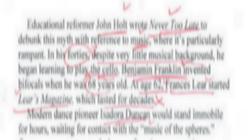The Freelance Writing FAQ: Frequently Asked Questions about Writing
for Newspapers & Magazines
by Marcia Yudkin
-
I've written an article
- how do I find someplace to publish it?
-
What's a query?
-
Can I
email or fax a query?
-
What is an SASE?
-
Should I try to find an agent?
II. RIGHTS AND OTHER LEGAL STUFF
-
Do we need to bother with a contract?
-
What do "first serial rights," "all rights," "one-time rights," "electronic rights" and "work for hire" mean and why should I care?
-
What's a "kill fee"?
-
Can I deduct writing expenses for tax purposes, and if so, how?
|
III COMMON WORRIES
-
How do I prevent people from stealing my ideas?
-
How long do I normally have to wait for a reply?
-
What if I've never published anything yet?
-
How do I get interviewees to talk to me?
-
Can I ask an editor for more money?
-
Are multiple submissions OK?
-
Why do I keep getting rejection letters?
IV. FREELANCE WRITING AS A CAREER
-
Can one make a living as a freelance writer?
-
What about publishing fiction?
-
How do I become a syndicated
columnist?
-
How can I get those first clips?
-
How do I break in to big-time magazines?
|
|
Published! How to
Reach Writing Success
|
|
V. FOR FURTHER INFORMATION
-
How can I find out more about freelance writing?
-
Are there organizations for freelance
writers?
-
How about freelancing resources on the Internet?
-
And who are you, anyway?
1. I've written an article - how do I find someplace to publish it?
Writing an article and then casting about for someone to publish it is the
least effective way to get published. There may in fact be no publication anywhere that can use an article with exactly that focus, length, voice, kinds of sources of information, etc. You have a much better chance of success if you send off queries before you write your article and then tailor
your piece to the preferences of an editor who has expressed interest in seeing it or buying it.
However, if you have already written the article, out of inspiration or
naiveté, research appropriate markets via the library's periodical bookshelves, newsstands and the old standby, Writer's Market, available in most bookstores and
libraries as well as online. Send the article to a specific editor along with a short cover letter stating what you're enclosing and who you are.
|
Get Your First Byline -
Quickly, Easily, With Expert Guidance
Gain personal instruction, feedback and
guidance from a veteran freelance writer who wants you to succeed,
in a self-paced, home-study magazine writing course for
beginners. Become published sooner when
you know how to approach and convince editors
you're able to provide them with a publishable
article that's relevant for their readers. Beginners
Magazine Course details. |
2. What's a query?
A query (also called a query letter) is a one-page proposal in business-letter format offering to write a specific piece for a specific magazine, addressed to a specific editor there by name. This is the basic sales tool of professional and aspiring freelance writers.
Ninety-five percent of my queries that have resulted in assignments to write the article have used the following format: first, a lead paragraph that could double as the first paragraph of the published article; second, a description of the focus or angle, content, format and, sometimes, sources for the proposed article; third, information about myself and why I'm the person to write this article; and finally, anything else that the editor needed to know about timing, photos, etc. I print this out on a very plain letterhead that includes my name, address,
phone number and email address.
You can also use a conventional business-letter approach, starting off, for example, "I am writing to propose an article about..." Whichever approach you use, though, the query must be articulate and interesting, and perfect in spelling, punctuation, grammar and usage.
Write it so that the editor finishes the letter and
thinks, "Yes
- here's an article that would work for us and a writer we can trust to write it appropriately and professionally."
|
Become a Master of Brevity
for Magazines' Rigid Word Counts
If a publication requests 1,000-word articles,
isn't sending in 2,000 words even better?
Definitely not! Editors require
freelancers to know how to get across rich
ideas, experiences and stories in as few words
as possible. Learn
concise writing. |
3. Can I email or fax a query?
Unless you already know an editor, or unless an editor has indicated
on the publication's web site an openness to receiving queries by
email or fax, it is best to send a query letter by mail. That also gives you an opportunity to enclose "clips"
- one or more samples of your previously published articles.
4. What is an SASE?
If sending a query by mail, it is customary to enclose a self-addressed stamped envelope for the editor's reply. Omit this only if you already know the editor well or if the editor has specifically requested material from you. Some editors will toss out your queries if you do not enclose an SASE. Across national borders enclose International Reply Coupons
- available at most post offices.
5. Should I try to find an agent?
Because reputable agents work only on commission, very few
handle submissions to magazines or newspapers
- it's just not worth their while. Until you have written a book proposal, there is no point in looking for a literary agent.
1. Do we need to bother with a contract?
A contract doesn't have to be a formal document filled with legal mumbo-jumbo. Any time an editor phones you to assign an article, ask, "Will you be sending me a contract?" If the answer is no, prepare a
letter that describes the agreed-upon terms of the assignment, such as content, length, due date, fee, rights to be purchased (see next question), etc., ending with, "If this properly represents what we agreed upon during our telephone conversation of [date], please sign one copy and send it back to me and retain the other copy for your files."
|
Either a formal contract or a signed agreement letter protects both of you from misunderstandings and gives you more options if the assigning editor leaves the magazine, the magazine goes bankrupt or is sold, or the magazine just doesn't honor its side of the deal. Unfortunately, practically every experienced freelancer has encountered one of these sorts of problems at one time or another.
If you don't like the terms
contained in a formal contract sent to you by the
magazine, negotiate. Usually there is leeway for
bargaining and negotiation, particularly when you
carry on in a businesslike manner. |
Leave
a Tip

If
this page solved your problem
quickly and wisely, consider sending
a tip to the author. |
2. What do "first serial rights," "all rights," "one-time rights," "electronic rights" and "work for hire" mean and why should I care?
When you sell your work to a publication, you are not selling the manuscript itself but the right to publish it
- and then the question arises, the right to publish it how many times and under what circumstances?
The fairest deal in most situations for writer and publication is "first serial rights," which means that the magazine buys the right to publish the piece first in any periodical anywhere. This is often modified by a geographical adjective, such as "First North American serial rights," or by a linguistic descriptor, such as "First English-language serial rights."
Once the magazine to whom you have sold first serial rights publishes the piece, you own it completely again. You can sell the exact same piece to another magazine, which would then be buying "second serial rights" or "reprint rights."
"All rights" is usually a bad deal for writers. It means you sell the magazine the right to publish the article as many times as they like, to resell or to license the rights to a movie or computer database or audio publisher without paying you another dime, ever.
If you're asked to sell all rights, try to negotiate
something better.
|
Run Your Business From the Beach, Shangri-La or Anywhere
Got the urge to hit the
road? Discover tips, tools and strategies for continuing to bring in the moolah while vacationing, traveling, moving to a temporary location or living full-time in an RV.
This course resolves your "but what about..." concerns about taking off.
Be a Digital Nomad. |

Take Your Business on the
Road Course |
|
"One-time rights" comes up mainly with newspapers, which generally don't care whether another newspaper across the country also published the same piece. They thus buy the right to publish the piece once, irrespective of priority.
But they may request that the purchase be exclusive to their circulation area, which means that you couldn't also sell it to a newspaper whose circulation overlaps with theirs.
"Work for hire" is even worse than "all rights"
- you are also selling your copyright and any claim on your piece of work forever. Unless you are an employee of that publication, a work for hire agreement must be signed by both parties to be valid. This usually amounts to out-and-out exploitation of writers; avoid it wherever you can.
"Electronic rights"
continues to be a big battleground in the magazine and newspaper world. As publications
began to make past and current issues available online, some
illicitly republished in electronic form contributions for which they only acquired one-time or first serial rights. Other publications
demanded that writers sign "contracts from hell" in which they
gave up electronic rights for no additional compensation. For more information, contact the Authors Guild, the American Society of Journalists and Authors or the National Writers Union.
3. What's a "kill fee"?
When an editor assigns you a piece to write, the terms of the agreement will often also include you getting a certain percentage of the purchase price for the article if you write it unsatisfactorily. This percentage is the "kill fee," and may be 10 percent, 25 percent, 33 percent, 50 percent
- or 100 percent if you're really lucky. After a publication pays you a kill fee, you own the rights to the piece and are free to sell it elsewhere.
4. Can I deduct writing expenses for tax purposes, and if so, how?
Consult a qualified tax advisor about your specific case, but in the United States you would use a Schedule C and can deduct such expenses as paper, postage, computer equipment,
dues in writing organizations, books and magazines necessary for research, seminar fees, and travel that
is strictly necessary for your freelance work.
1. How do I prevent people from stealing my ideas?
Ideas are very rarely "stolen" in the freelance world. Beginners often jump to the conclusion that this has happened because they don't understand how common it is for writers to separately and independently come up with the same idea and submit it to the same publication.
The best way to prevent an editor from taking your idea and assigning it to another writer is to write your query so that it's obvious that you already know a great deal about your subject
or have special sources of information that you'll use in preparing the article.
Note that one cannot legally copyright an idea, only the specific expression of an idea.
The moment you fix your idea in tangible form, what you
wrote is automatically covered by copyright law. You do not need to place a copyright notice on it, and many editors therefore take such a copyright notice on unpublished work as a mark of an amateur.
2. How long do I normally have to wait for a reply?
Four to six weeks is typical. Be sure to wait at least the amount of time reported in
Writer's Market or the publication's
writers' guidelines before writing or calling to inquire about the status of your query or manuscript.
3. What if I've never published anything yet?
Never state in a query or cover letter, "I've never published anything before." It inevitably sounds apologetic and unconfident. Just write as well as you can, and be ready to do your best if an editor asks you to write a piece "on spec"
- that is, on speculation, letting them see it without any promise or obligation to buy it.
4. How do I get interviewees to talk to me?
I've never tried to get an exclusive with Madonna, but in
25+ years of freelancing, I've found people surprisingly willing to be interviewed for articles or books. To maximize the chances for cooperation, I always call and introduce myself as a writer working on a such-and-such for so-and-so, and say that I would like to interview them. I always
offer an estimate of how long I think the interview would take, so they know that I respect their time. Only a handful of people have ever refused.
5. Can I ask an editor for more money?
Most editors have some discretion in how much they can pay for each piece, and you'll never know if they'd use that discretion in your favor unless you ask. Be
businesslike in asking for money, as in, "Can you do better than $200? It will take me a week to research and write the piece."
6. Are multiple submissions OK?
Multiple queries are usually fine, so long as you know what you'll do if more than one publication wants your article. Multiple submissions of completed articles, however, can lead to trouble. I know two people who each had a completed article simultaneously accepted for publication and typeset at two competing magazines. The respective editors got very angry at the freelancers, even though the editors should have notified the writers for permission before getting ready to publish the articles.
7. Why do I keep getting rejection letters?
If you're not yet receiving what I call "nice rejection letters"
- those that are personally written to you rather than
form letters - you're probably doing something fundamentally wrong.
Hire a professional to look over your queries. The problem might be vague or too-generic ideas, inappropriate markets, poor writing or sloppy execution. Or perhaps you're aiming only at the most competitive markets without something special to offer.
Try some less glamorous publications.
If you are receiving personalized rejection letters, write back to those editors quickly and you will soon begin to develop a relationship with them that eventually culminates in work if you are persistent and professional.
1. Can one make a living as a freelance writer?
I've interviewed dozens of freelance
writers earning six figures a year, some of them as
little as two years after getting started. Most of
the high-earning writers have followed one or more of these strategies:
-
Develop relationships with magazines that use their work regularly,
so they spend more time writing on assignment and
less time marketing themselves
-
Cultivate related sources of income, e.g. from teaching, consulting, writing for businesses
-
Write books
2. What about publishing fiction?
One can't query for fiction, but all the rest of the above applies. Short story writers can still negotiate rights with editors, build relationships with editors, etc.
3. How do I become a syndicated
columnist?
If you dream of becoming the next Dave Barry or
Dear Abby, start local. Make your column an unquestionable success in one paper and then either approach established syndicates, which are listed in
Writer's Market, or sell the column to other papers on your own, which is called self-syndication.
4. How can I get those first clips?
When editors look at samples of your work, they are primarily interested in your writing style and mastery of the craft, rather than where the sample was published or how much you were paid. Therefore valuable first clips can result from offering to write for an organizational newsletter, your community newspaper or any other small-circulation publication that is desperate for decent work.
5. How do I break in to big-time magazines?
Even if you've never been published, you have a chance to catch the attention of a major magazine if you can provide something more experienced writers can't: your personal experience; access to inside information about a subject of interest to the magazine's readers; professional expertise that you can communicate at the readers' level; a local story that the national press hasn't covered; or a unique voice or quirky perspective on ordinary events.
1. How can I find out more about freelance writing?
- Lisa Collier Cool, How to Write Irresistible Query Letters,
Writers Digest Books.
- Samuel G. Freedman and Timothy
Harper, The ASJA Guide to Freelance Writing, St.
Martin's Griffin.
- Marcia Yudkin, Writing Articles
About the World Around You, available on Kindle
and as an audiobook.
2. Are there organizations for freelance writers?
- American Society of Journalists and Authors: 1501 Broadway, Suite 302, New York, NY 10036; 212-997-0947;
www.asja.org
- Authors Guild: 330 West 42nd St., New York, NY 10036; 212-563-5904;
www.authorsguild.org
- International Women's Writing Guild: Box 810, Gracie Station New York, NY 10028; 212-737-7536;
www.iwwg.com
- National Writers Union: 873 Broadway, Suite 203, New York, NY 10003; 212-254-0279;
www.nwu.org
3. How about freelancing resources on the Internet?
Find more than a dozen articles on
successful freelance writing right here at this web
site. Go to the article
index.
4. And who are you, anyway?
I'm the author of hundreds of articles in magazines ranging from the
New York Times Magazine to New Age Journal and of
11 books, including Freelance Writing for Magazines & Newspapers
and 6 Steps to Free Publicity. I've spoken at more than 50 writers' conferences nationwide and
have coached more than 120 writers one-on-one. For more information, visit
http://www.yudkin.com or
email marcia@yudkin.com.
Copyright © 1995, 1999, 2001, 2007,
2014 Marcia Yudkin. All rights reserved.
Please do not reprint in any form without explicit
permission.
Digg This
Bookmark on del.icio.us
Submit to Reddit
|
Become a Successful
Freelance Writer - Start Today!
Slash your learning curve by completing nine
article idea generation and writing assignments
and gaining feedback from a Book-of-the-Month
Club author who has published in the New York
Times Magazine, Psychology Today, Cosmopolitan,
Business 2.0 and many other top
publications. Breaking
Into Print Course details.
|
|











